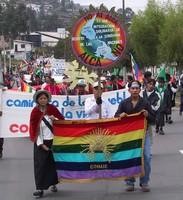Just over a decade ago, a sea of supporters dressed in red and lining the streets of Caracas celebrated Hugo Chávez's landslide election victory in Venezuela, marking a watershed in the Latin American political landscape and signaling the emergence of the so-called populist left in the region. Chávez was subsequently followed by a wave of left-wing leaders elected across the continent -- Lula in Brazil (2002), Néstor Kirchner in Argentina (2003), Tabaré Vázquez in Uruguay (2004), Evo Morales in Bolivia (2005), and a year later Michelle Bachelet in Chile and Rafael Correa in Ecuador -- leaving roughly 75 per cent of South America's 382 million inhabitants living under a leftist government. While these leaders share some common characteristics, there are vast differences between them. Chávez and Bachelet, for instance, are worlds apart, reflecting what Jorge Casteñada, an academic and former foreign minister of Mexico, described two years ago in a Foreign Affairs article as two distinguishable Latin American lefts. One of them, characterized by Chile and Brazil and referred to alternately as social democrats, the moderate left, and sometimes the soft left, is "modern, open-minded, reformist, and internationalist." By contrast, Castañeda argued, the other left, exemplified by Chávez, Morales and Correa, is "born of the great tradition of Latin American populism," and is "nationalist, strident, and close-minded." Nevertheless, the current tide of left-wing leaders shares a historical context. First, their rise can be seen as a backlash to the economic neoliberalism adopted across Latin America during the 1980s. Forming part of the so-called Washington consensus, neoliberal policies emphasized free-market reforms, the privatization of state industries, trade liberalization such as the North American Free Trade Agreement (NAFTA), and deregulation as key ways to advance development and prosperity. Neoliberalism was subsequently blamed by some for the region's poor economic growth, the widening gap between rich and poor, currency devaluation and chronic debt crises such as that experienced by Argentina in 2001.
The Challenge of South America’s Populist Left

